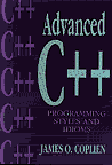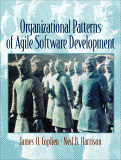|
|
Presentation: "Organizational Patterns and Scrum: Fine-tuning your Agile Implementation"
Time:
Wednesday 11:30 - 12:30
Location:
Rytmisk Sal
Abstract: Scrum is easy to describe but hard to do: you've heard that a million times. And you've read the famous Nokia Test and believe it gives you an easy path to making your Scrum work. However, most Scrum failures are subtle - and after you're dead, you won't even know what got you. Scrum comprises over 50 organizational patterns, each one of which is crucial to a successful software Scrum implementation. Patterns can help you find and fix these problems - come to this hands-on session to learn how.
Prerequisites: Basic knowledge of the Scrum framework
Level: Intermediate
Expectations: What Organizational Patterns are, how to use them to diagnose a Scrum implementation, and how to use them to address subtle problems in Scrum implementations
Download slides
|
Gertrud Bjørnvig, Driven by Agile Patterns and Anthropological studies of Software Development

Gertrud focuses on Agile and Lean software development. She does courses and consultancy in user stories, use cases, and product backlogs. Together with her partner Jim Coplien, she also does agile assessments and agile team analyses based on organizational patterns. Her favorite development framework is Scrum. Gertrud has a hobby as a “Software Development Anthropologist” where she analyses trends and practices in software development through the glasses of an
anthropologist.
Jim O. Coplien, Creator of C++ idioms, founder of organizational patterns, and leading spokesperson for Agile Architecture

Jim Coplien ("Cope") is the father of Organizational Patterns, is a co-
founder of the Software Pattern discipline, a pioneer in practical
object-oriented design in the early 1990s and is a widely consulted
authority and author in the areas of software design and
organizational improvement. He currently works as Software Architect
and Agile Consultant at Gertrud&Cope in Denmark. He is also a partner
with the Scrum Training Institute, which provides premiere Scrum
training and consulting world-wide. He sits on the editorial board of
the LNCS Pattern Journal, is a Member Emeritus of the Hillside Group,
and is a Certified Scrum Trainer.
Cope does extensive consulting in Europe, North America, and the
Middle East, with a special focus on the Nordic countries. He is a
frequently-sought conference speaker at major European conferences,
and serves as a co-organizer of many patterns conferences. He
regularly gives international seminars on Lean Architecture, Scrum
fine-tuning, patterns, and Agile software development. He has
organized and led outreach programs to make Scrum certification
training available at no cost to students at partner universities
world-wide, as well as to software professionals in emerging
countries. He still writes code for a living once in a while.
He is also a researcher and a past holder of the Vloebergh Endowed
Chair at Vrije Universiteit Brussel. He has past affiliations with
Flinders University in Adelaide and with Manchester University, and is
a past professor at North Central College in the United States. He is
currently doing joint research with Trygve Reenskaug on the DCI
architecture paradigm. He also leads research programs in the theory
of design and organizational patterns. Together with Gertrud Bjørnvig,
he is writing a new book on Lean Architecture and Agile Software
Development, to be published by John Wiley in 2010.
Books
Cope has written or co-authored several books in his career, including the seminal Advanced C++ Programming Styles and Idioms, originally a Jolt Cola productivity winner, and still strong in its sixteenth year.

His most recent book, co-authored with Neil Harrison, is Organizational Patterns of Agile Software Development.

He was one of the first authors to treat the concept of domain-driven design, together with modern programming principles such as object orientation, in his Multi-Paradigm Design for C++:

|
 |
| |







